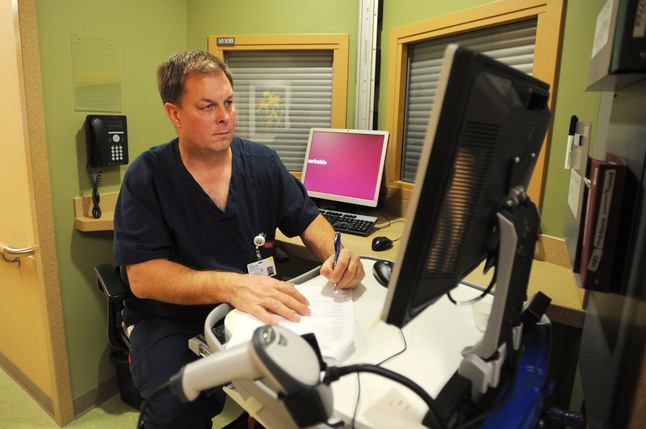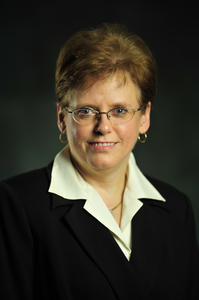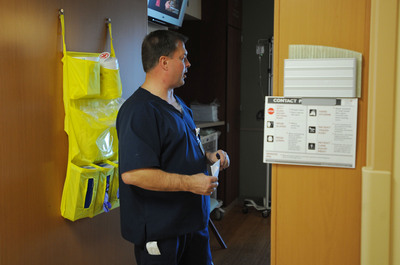
Nurse Larry Johnson fills out charts Thursday in the fungal meningitis ward at St. Joseph Mercy Ann Arbor in Superior Township. Johnson, who works as an oncology nurse at St. Joseph Mercy Port Huron, is among a group of nurses from other Trinity Health System hospitals that have responded to a call to help care for fungal meningitis patients in Ann Arbor.
Melanie Maxwell | AnnArbor.com
Doctors and nurses at St. Joe’s and at hospitals in 19 states across the country are dealing with an extremely rare illness with no established course of treatment. Friday, the hospital was treating 79 patients -- up six from the day before, which is more than the total caseload that many other states dealing with the outbreak have all together.
In Michigan, 129 of the 158 cases linked to the fungal meningitis outbreak have been treated at St. Joseph Mercy Ann Arbor at 5301 McAuley Drive in Superior Township as of Friday.
As a result, the hospital has had to open a previously unequipped ward in its recently built patient tower last week and has brought in additional nurses to provide the round-the-clock treatment and observation of the fungal meningitis patients.

Joyce Young
Courtesy photo
In a matter of 48 hours, crews had equipped 16 private patient rooms on the 10th floor of the tower with all of the beds and technology necessary to house specialized patients. The remaining 16 rooms on the floor remain as empty shells, awaiting monitors and amenities to house patients.
Additionally, the Trinity Health System has sent out a call for additional nurses to volunteer to work at the St. Joseph Mercy Ann Arbor location to help accommodate the demanding patient load.
The nationwide fungal meningitis outbreak is linked to a Framingham, Mass. company’s injectable steroids contaminated with fungus. At the New England Compounding Center, federal investigators have found many potential contaminants, including standing water, mold and water droplets, according to a report by the Associated Press.
The facility has been closed since early October, and Massachusetts officials are working to permanently revoke its license, according to the Associated Press.
Four Michigan facilities received shipments of batches of contaminated steroids manufactured by the NECC.
Among the facilities was Michigan Pain Specialists in Brighton, where the steroids were administered as injections to relieve joint and back pain. Though none of the injections were administered at St. Joseph Mercy Ann Arbor, several physicians who practice at St. Joe’s also practice privately at the Brighton facility.
The federal government has launched a criminal investigation into the outbreak, which is linked to the illnesses of 480 patients, including 33 deaths across the U.S. as of Friday.
Throughout the investigation in to the outbreak -- which was first announced to have infected Michigan patients Oct. 6 -- St. Joseph Mercy Ann Arbor has managed one of the largest patient populations with fungal meningitis in the country.
At the University of Michigan Health System, one fungal meningitis patient is currently being treated, spokesman Pete Barkey said. Throughout the entire outbreak, UMHS has treated three fungal meningitis patients.

Larry Johnson, a nurse from St. Joseph Mercy Port Huron who volunteered to help with the fungal meningitis outbreak patients being treated in Ann Arbor, walks down the hallway of a ward Thursday opened specially for fungal meningitis patients with Joyce Young, chief nursing officer.
Melanie Maxwell | AnnArbor.com
Nurses have come to St. Joseph Mercy Ann Arbor from Columbus, Ohio; Port Huron and Grand Rapids. They'll be serving two-week tours in Ann Arbor.
For nurses who are licensed to practice in Ohio, the Michigan board has provided emergency reciprocity for those nurses to be licensed to practice in Michigan, Young said.
Among those volunteers is Larry Johnson, an oncology nurse from St. Joseph Mercy Port Huron. He’s been working at the hospital in Port Huron for about two years, where he typically administers chemotherapy treatments to cancer patients.
Johnson said he had been following the news of the fungal meningitis outbreak before learning of its effects on the Trinity Health System.
Last week, Johnson said he heard of the call for nurses from one of his superiors. There was no question in his mind what his answer would be.
“My first thought was absolutely, I want to help,” Johnson said. “I had no qualms about saying yes.”
Last Saturday, Johnson drove to Ann Arbor and went through an orientation. Sunday, he was straight to work and clocked a 16-hour shift. Since then, he’s been working 12-hour days.
Johnson, who also is an on-call firefighter with the Fort Gratiot Fire Department, said the long hours are standard for him.
“The biggest thing that is different with the fungal meningitis patients, is the fear of the unknown,” Johnson said. “People are afraid of the unknown. They want to know that someone cares enough to find out what happened to them.”
As a nurse, Johnson said he makes a special point to educate patients and their families.
Before he became a nurse, Johnson was injured in an accident that almost resulted in the loss of his right arm. While in the hospital, Johnson said his attending nurse wasn’t as supportive as he felt she could have been, and it inspired him to be more personable in his own career.
“I was going to be the one that was not like that,” Johnson said. “I know what it is to be afraid.”

Nurse Larry Johnson checks on a fungal meningitis patient Thursday in a ward at St. Joseph Mercy Ann Arbor in Superior Township.
Melanie Maxwell | AnnArbor.com
The two drugs being used to treat fungal meningitis patients are very toxic and have side effects that include hallucinations.
Patients routinely ask Johnson if and when they’ll get better; if the side effects from the medication are permanent; when they’ll be able to go home.
“Sometimes, we’re not able to tell them the answer they want to hear,” Johnson said. “They feel such an utter loss of control.”
Patient care also has increasingly included social workers and spiritual guidance, Young said.
“There’s a lot of fear in what they’re going through,” Young said of the patients.
Johnson said at times, he grapples with the patients’ reality.
“Sometimes, my heart is heavy,” Johnson said. “At times, it’s emotionally taxing.”
Fungal meningitis patients need a lot of specialized care, and many need to be constantly hooked up to specialized heart monitors. Many have been through neurosurgical procedures, Young said.
Staff at St. Joseph Mercy Ann Arbor have daily conference calls and are in constant communication with the Centers for Disease Control and Prevention to guide their treatment plans and provide updates.
“Really, we’re in uncharted waters,” Johnson said. “It’s scary.”
Amy Biolchini covers Washtenaw County, health and environmental issues for AnnArbor.com. Reach her at (734) 623-2552, amybiolchini@annarbor.com or on Twitter.